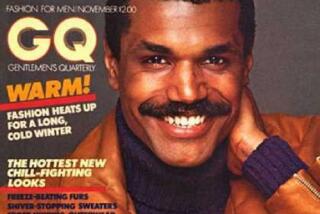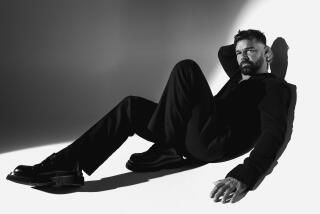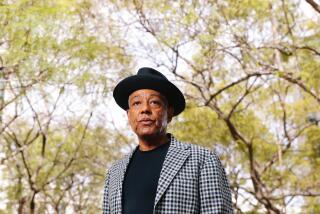Actor’s life laid bare
“I’m a bastard, a Catholic, the son of a prostitute, and a product of the poorest slums of St. Louis,” says Robert Guillaume, reading from the opening of his memoir to a standing-room-only crowd at Eso Won bookstore, on La Brea Avenue near Baldwin Hills. “ ... How did I get from there to here?”
Here is the age of 75, with two Emmys to his name, one for his work in “Soap,” the other for “Benson”; a second marriage, his only successful union; a teenage daughter, the only one of his five children to grow up with him; an exhibition of his career memorabilia at the Smithsonian’s Anacostia Museum in Washington, D.C.; and a new book that describes a private life far from his public image.
“Guillaume: A Life” (University of Missouri Press), his candid autobiography co-written with David Ritz, sugarcoats nothing: not his sad beginnings; his resulting rage; his mistreatment of women; his abandonment of his older children; the 1990 death of his youngest son, Jacques, from complications of AIDS; or the stroke four years ago in January on the set of “Sports Night” that weakened his left side, stole his independence and forced him to give up his beloved Cadillac.
Here is a very long way from where Robert Williams was born on Nov. 30, 1927.
Fatherless. Rejected by an abused, alcoholic mother who hated his dark skin. Growing up in a back-alley apartment with neither electricity nor plumbing. Sharing an outhouse with two dozen people. Very, very poor.
His grandmother, Jeannette Williams, rescued him. She taught him to read. A domestic, she sacrificed to send him to Catholic school, a mixed blessing. The nuns provided a good education, but many favored black children with much lighter skin and “good hair.”
He wanted to be special.
Did they know he was smart? After a couple of weeks in the first grade, he was promoted to the third grade.
Did they know he was good? The altar boy perfectly enunciating the Latin responses, always ringing the little bells at the right time during Mass. He wanted to become a priest. But he was told no boy born out of wedlock could follow that sacred path.
Did they know he could sing? His “Ave Maria” soared. His Gregorian chant was beautifully holy. In the school musical, his “Just a Kid Named Joe” brought down the house.
But nothing was ever good enough. Rejected everywhere -- at home, at school, even by his religion -- he disrupted class, talked back to the priests, refused to obey the nuns.
“By 12 or 13, I began to feel unloved,” Guillaume says in an interview in the family room of his Encino home. “I was loved by my grandmother, but that didn’t count. It was my mother’s love that I was seeking.” He knew that wasn’t going to happen.
He stopped trying, stayed in trouble. He “grew increasingly hostile,” got kicked out of high school, enlisted in the Army, got booted out of it too (although with an honorable discharge).
Back in St. Louis, he worked at the post office, quickly finished high school and enrolled in Jesuit-run St. Louis University, proving once again that, yes, he was smart. He aced philosophy, “devoured Shakespeare” and read “Paradise Lost,” feeling the pain and anger in Satan, relating to “his fury.”
He became the city’s first black streetcar driver, switched to the elite Washington University in St. Louis, where a music professor recognized his talent, and trained his rich tenor on German lieder.
Always on the make, at age 21 he escalated his “here today, gone tomorrow” treatment of women. He fathered a daughter, Patricia, in 1950; never married her mother; and abandoned her as a baby.
His grandmother’s death in 1951 revealed just how impotent he was.
“I couldn’t bury her,” he says. For years, she had paid religiously on a burial policy. The premium didn’t cover a fifth of the cost. Duped, she ended her life in a pauper’s grave. “I was so terribly devastated, and still am, by the fact that I could never do anything for this woman who had sacrificed for me,” he says.
He sacrificed for nobody. He married his first wife in 1955, and he soon abandoned her and his two sons, Kevin and Jacques, a pattern he would repeat in 1980 with his next daughter, Melissa, and her mother.
Instead, he pursued a singing career that propelled him, song after song, to New York, through a name change from Williams to Guillaume, on to musical productions in Europe, where he quickly picked up the languages, always enunciating perfectly. He performed on Broadway and finally on television, where he would become famous not for his singing, but for his acting.
As a servant.
His Benson was anything but servile. He skillfully played the character without shuffling. John Wesley, then a young actor about to appear on the show, remembers his advice: “You don’t have to spook it up.”
“I had reached,” he says, “the confidence not to play old stereotypes.... I had seen people who could make you laugh without clowning.”
Guillaume is “an African American who was not in an African American show, but whose work showed that African Americans could be funny and have dignity,” says Steve Newsome, director of the Anacostia Museum & Center for African American History and Culture, in a telephone interview from Washington. “Roles, Reaction and Reality: The Robert Guillaume Collection,” which closes Thursday, displays newspaper articles, reviews, photos, awards, fan mail, playbills, CDs and costumes spanning his Broadway hits, including “Guys and Dolls” and “Purlie,” his best-known television shows “Soap,” “Benson” and “Sports Night,” and his performance in the 1990 L.A. production of “The Phantom of the Opera.”
The perceptions of black viewers mattered to Guillaume. In a conversation with actor-director Robert Townsend, held at the museum earlier this month to coincide with the opening of the exhibit, he reflected on concerns that his friends expressed in 1977 about a black actor playing a butler on an otherwise white television show: “If I’d done it 10 years earlier, people would have said, ‘Get that guy out of here. He’ll set us back 100 years.’ ”
He didn’t. He had the confidence to insist that the socially mobile Benson rise from butler to lieutenant governor.
In 1979, he won an Emmy for best supporting actor in a comedy for his role as Benson in “Soap.” In 1985, he won an Emmy for best actor in a comedy for his title role in the spinoff “Benson.” He was, as his book recounts, “a bona fide star.”
He began to recapture the feelings he had as a child -- that maybe he was handsome and charming. But where another successful man in his late 50s might have sought a trophy starlet, he chased an intellectual trophy, Donna Brown, a Harvard-trained, very independent KCBS-TV news producer.
She made demands. Get rid of your live-in girlfriend. Get divorced from a wife you haven’t lived with for nearly 40 years. Become monogamous.
He complied.
What motivated this transformation? His wife’s demands? Maturity? On the last page of his book, he writes: “To assuage bitterness requires more than human effort. Relief comes from a source we cannot see but can only feel. I am content to call that source love.”
He avoids the therapist’s couch, but he thinks he has forgiven his mother. Forgiving himself for walking away from his older children is much harder, although he has reconciled with them.
Donna Brown Guillaume says that, with her, he got the nuclear family he missed as a child. He got family he could count on, including John Wesley, who became his brother-in-law and, since the stroke, his frequent companion.
And at age 61, he got another chance at fatherhood. Rachel is now 14.
He’s played many roles. He’ll play many more. He’s rehearsing for a part as a judge on an NBC replacement show, “A.U.S.A.” (assistant U.S. attorney), scheduled to air in February. He’s preparing for a role as a doctor in the movie “Big Fish,” the story of a dying father and his son, to be directed by Tim Burton for Columbia Pictures. But today his paramount role is Dad.
“Donna has done things that, 20 years ago, I’d walk. But, I did decide that the reason for me to stay is Rachel,” he says. “I have more of an appreciation for, simply, the ubiquity of a parent. It’s all well and good to say you love someone, but if that person is not there, that speaks louder to the child. The child thinks, ‘Is there something about me?’ My other children all suffer from that, and I wanted to spare Rachel, if I could.”
More to Read
Sign up for our Book Club newsletter
Get the latest news, events and more from the Los Angeles Times Book Club, and help us get L.A. reading and talking.
You may occasionally receive promotional content from the Los Angeles Times.







